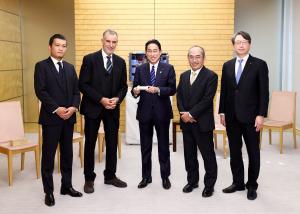ITER Director-General meets Prime Minister Kishida
Pietro Barabaschi, before becoming the Director-General of the ITER Organization in September 2022, led the European contributions to the JT-60SA tokamak project—a major upgrade of the Japanese tokamak JT-60U being carried out jointly by Europe and Japan under the Broader Approach agreement. It has been estimated that his duties as JT-60SA project leader since 2007, and later as director of the totality of the Broader Approach activities, had led him to travel over 180 times to Japan.
The bilateral meeting took place just one day before the inauguration of the JT-60SA tokamak which, until ITER operation, will be the largest tokamak in the world.
At the meeting, Prime Minister Kishida underscored the continued commitment of Japan to the ITER Project. Director-General Barabaschi expressed his appreciation for the continued contributions of Japan to ITER, and the country's role as one of the historical founders of the international collaboration to demonstrate the scientific and technological feasibility of fusion energy for peaceful purposes.
The meeting with Prime Minister Kishida was of historical significance to the ITER Project, as it was the first time that an ITER Director-General had met the head of government of an ITER Member.
During his trip, Director-General Barabaschi also met with Masakazu Tokura, the chairman of the Japan Business Federation Keidanren, and attended a trilateral meeting with Masahito Moriyama, Minister of Education, Culture, Sports, Science and Technology (MEXT), and European Commissioner for Energy Kadri Simson.



